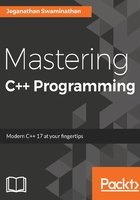
上QQ阅读APP看书,第一时间看更新
New rules for type auto-detection from braced initializer list
C++17 introduced new rules for auto-detection of the initializer list, which complements C++14 rules. The C++17 rule insists that the program is ill-formed if an explicit or partial specialization of std::initializer_list is declared:
#include <iostream>
using namespace std;
template <typename T1, typename T2>
class MyClass {
private:
T1 t1;
T2 t2;
public:
MyClass( T1 t1 = T1(), T2 t2 = T2() ) { }
void printSizeOfDataTypes() {
cout << "\nSize of t1 is " << sizeof ( t1 ) << " bytes." << endl;
cout << "\nSize of t2 is " << sizeof ( t2 ) << " bytes." << endl;
}
};
int main ( ) {
//Until C++14
MyClass<int, double> obj1;
obj1.printSizeOfDataTypes( );
//New syntax in C++17
MyClass obj2( 1, 10.56 );
return 0;
}
The preceding code can be compiled and the output can be viewed with the following commands:
g++-7 main.cpp -std=c++17
./a.out
The output of the preceding program is as follows:
Values in integer vectors are ...
1 2 3 4 5
Values in double vectors are ...
1.5 2.5 3.5